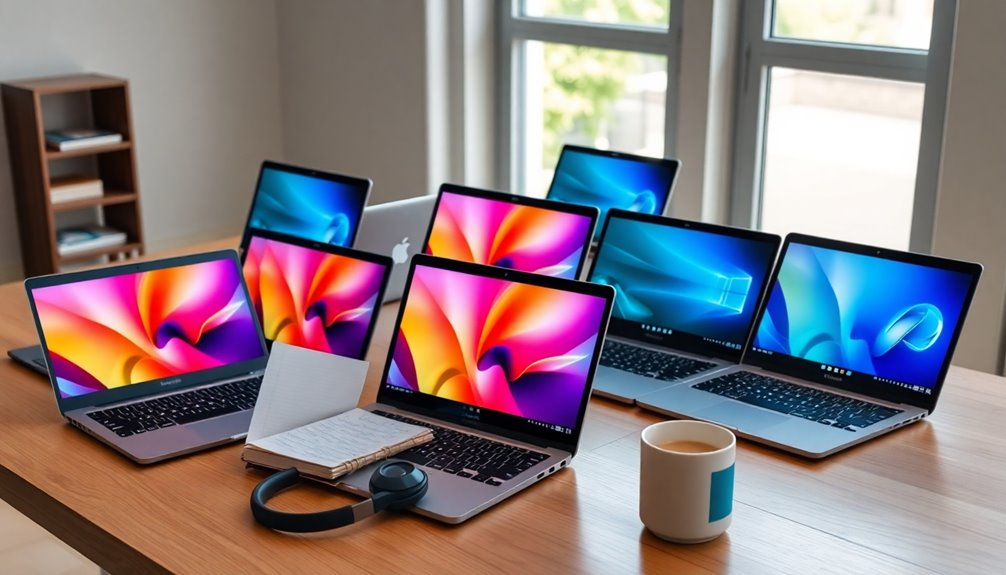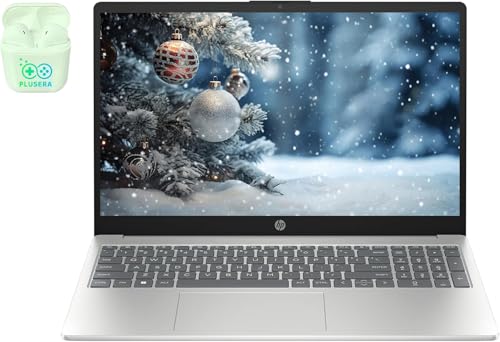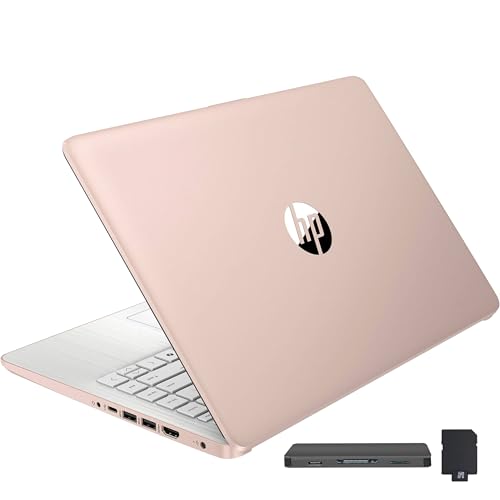In 2025, I've found the 14 best laptops for students that cater to every budget. Whether you need a powerful machine like the HP 15.6 FHD for multitasking, or something lightweight like the HP 14 Ultralight, there's something for everyone. For those on a budget, the HP Portable Laptop offers decent specs without breaking the bank. I also love the Lenovo IdeaPad 1 for its solid performance. Battery life and portability are key factors to keep in mind. If you're curious about which specific models suit your needs, you'll want to stick around for more details!
Key Takeaways
- Select laptops with at least 8GB RAM for effective multitasking and smooth performance during classes and assignments.
- Look for models with SSD storage of 256GB or more for faster boot times and file access.
- Consider lightweight designs under 5 pounds for easy portability between classes and study sessions.
- Opt for a high-definition display (1920 x 1080) to ensure clear visuals for presentations and multimedia.
- Evaluate battery life, aiming for a minimum of 6 hours to support a full day of use without charging.
HP Premium 17.3 Touchscreen Laptop
The HP Premium 17.3 Touchscreen Laptop stands out as an ideal choice for students who crave both performance and versatility. With its Intel Core i3-N305 processor, I can tackle multiple tasks effortlessly, thanks to the impressive 32GB of RAM. The 1TB PCIe NVMe M.2 SSD guarantees fast boot-up times and quick data transfers, which is perfect for my busy schedule. The 17.3-inch touchscreen display provides vibrant visuals and easy navigation, making it a joy to use for studying or streaming. I appreciate the variety of ports, including USB Type-C and HDMI, allowing me to connect to various devices. Plus, with Wi-Fi 6, I get reliable internet connectivity, which is vital for online classes and research.
Best For: The HP Premium 17.3 Touchscreen Laptop is best for students and professionals seeking a powerful, versatile device for multitasking and entertainment.
Pros:
- High-performance with an Intel Core i3-N305 processor and 32GB of RAM for seamless multitasking.
- Large 17.3-inch touchscreen display provides vibrant visuals and enhances user interaction.
- Ample storage with a 1TB PCIe NVMe SSD for quick boot times and fast data transfers.
Cons:
- HD+ resolution (1600 x 900) may not meet the expectations of users seeking Full HD or higher.
- Limited storage options with only 128GB eMMC, which may be insufficient for heavy users.
- Weight may be higher than other ultraportable laptops, affecting portability.
HP Portable Laptop with Intel Quad-Core N4120 and 16GB RAM
For students seeking a reliable laptop that's both portable and budget-friendly, the HP Portable Laptop with Intel Quad-Core N4120 and 16GB RAM stands out. This compact device features a 14-inch HD display and runs on Windows 11 Home, making it perfect for everyday tasks like internet browsing and MS Office applications. With 16GB of RAM and a lightweight design, it's easy to carry around campus. However, I found the keyboard contrast a bit challenging, as the light keys can be hard to read. While it's great for basic use, I recommend keeping an eye on storage due to pre-installed apps. Overall, it's a solid choice if you need something dependable without breaking the bank.
Best For: Students and light users looking for an affordable, portable laptop for basic tasks.
Pros:
- Compact and lightweight design makes it easy to carry around.
- 16GB RAM ensures adequate performance for everyday applications.
- Affordable price point makes it a budget-friendly option for students.
Cons:
- Keyboard contrast issues can make typing difficult due to visibility problems.
- Limited storage capacity with 64GB eMMC, especially with pre-installed apps.
- Mixed customer feedback regarding performance and customer service experiences.
HP 15.6 FHD Business & Student Laptop Computer
Students seeking a powerful yet portable laptop should consider the HP 15.6 FHD Business & Student Laptop Computer. With a 10-core Intel Core i5 processor and 64GB of RAM, it handles multitasking with ease, making it perfect for both studies and entertainment. The 15.6-inch FHD display provides sharp visuals, enhancing your browsing experience. Plus, the 2TB SSD means you won't run out of storage anytime soon. Connectivity options like USB-C, HDMI, and Wi-Fi 6 guarantee you stay connected effortlessly. Designed for productivity, it features Windows 11 Pro and a numeric keypad for quick data entry. With a battery life of up to 9.5 hours, this laptop is a reliable choice for any student.
Best For: Students and professionals who require a powerful, portable laptop for multitasking and productivity.
Pros:
- High performance with a 10-core Intel Core i5 processor and 64GB of RAM for seamless multitasking.
- Ample storage capacity with a 2TB SSD, ensuring plenty of space for files, applications, and media.
- User-friendly design featuring Windows 11 Pro, a numeric keypad, and long battery life of up to 9.5 hours.
Cons:
- Weight might be a concern for users looking for an ultra-light laptop for portability.
- Limited gaming capabilities due to reliance on integrated Intel Iris Xe Graphics.
- Potentially higher price point compared to entry-level laptops with lesser specifications.
HP 14 Ultralight Laptop with Intel Quad-Core, 8GB RAM, 192GB Storage
Weighing in at just under three pounds, the HP 14 Ultralight Laptop is a game-changer for anyone in need of portability. With its Intel Celeron N4120 processor and 8GB of DDR4 RAM, it handles multitasking effectively, making it perfect for students like me who juggle coursework and writing. The 14-inch HD display is decent for everyday use, and the battery life is impressive, allowing me to work on the go. While it includes a one-year subscription to Office 365, I've noticed some limitations in "S" Mode, which can be frustrating. However, for basic tasks, this laptop offers great value without unnecessary features. Just keep in mind it's not suited for gaming or heavy multitasking.
Best For: The HP 14 Ultralight Laptop is best for students and light users who need a portable and functional laptop for basic tasks.
Pros:
- Lightweight and portable, making it easy to carry for on-the-go use.
- Impressive battery life allows for extended usage without frequent charging.
- Good multitasking capability with 8GB of RAM, suitable for coursework and writing.
Cons:
- Limited app downloads in "S" Mode can be frustrating for some users.
- Reports of screen flashing and power issues after a few months of use.
- Not suitable for gaming or heavy multitasking, which may limit its appeal for some.
NIMO 15.6 FHD Student Laptop
The NIMO 15.6 FHD Student Laptop stands out with its impressive 16GB of RAM, making it perfect for those who juggle multiple applications and browser tabs while studying. With an Intel Pentium Quad-Core N100 processor, it delivers up to 3.4GHz of power, ensuring smooth performance for multitasking. The 15.6-inch FHD display offers vibrant visuals, while the 1TB PCIe SSD provides ample storage and rapid boot-up times. Weighing just 5.29 pounds, it's easy to carry around campus. Plus, the backlit keyboard and built-in fingerprint sensor add to its convenience. Although the battery life may require frequent charging, its sleek design and competitive pricing make it an excellent choice for students looking for performance without breaking the bank.
Best For: Students who need a powerful and portable laptop for multitasking and studying on the go.
Pros:
- Lightweight and sleek design, making it easy to carry around campus.
- Impressive 16GB RAM and 1TB SSD for smooth performance and ample storage.
- Backlit keyboard and built-in fingerprint sensor enhance usability and security.
Cons:
- Battery life may require frequent charging during intensive use.
- Sound quality issues reported for specific tasks.
- Integrated graphics may not support high-end gaming or graphic-intensive applications.
Lenovo IdeaPad 1 Student Laptop
For anyone seeking an affordable and efficient laptop for basic college work, the Lenovo IdeaPad 1 stands out with its impressive 20GB of RAM. This dual-core Intel Celeron processor runs at 1.1 GHz, boosting to 2.8 GHz, making multitasking a breeze. The 15.6-inch FHD display is bright and clear, perfect for reading and writing assignments. With a 1TB PCIe NVMe SSD, I can quickly boot up and transfer files. While some users mention slow performance with basic tasks, I find it suitable for web browsing and document editing. However, accessing Microsoft Office 365 can be tricky. Overall, it's lightweight, easy to set up, and offers great value, though some might struggle with Windows 11's interface.
Best For: Students and casual users looking for an affordable laptop for basic tasks like web browsing and document editing.
Pros:
- High 20GB RAM allows for smooth multitasking and running multiple applications.
- Fast SSD storage ensures quick boot-up times and file transfers.
- Lightweight and easy to set up, making it ideal for students on the go.
Cons:
- Some users report slow performance with basic tasks, which may affect efficiency.
- Access issues with Microsoft Office 365, leading to confusion with software availability.
- Mixed feedback on Windows 11 interface, which may pose challenges for users accustomed to earlier versions.
HP Stream 14 HD Laptop (Intel Celeron N4120, 16GB RAM, 288GB Storage)
Ideal for students seeking a budget-friendly option, the HP Stream 14 HD Laptop combines portability and performance with its lightweight design and robust 16GB RAM. This laptop features an Intel Celeron N4120 processor, making it suitable for basic tasks like word processing and browsing. The 288GB storage gives you ample space for files, while the 14-inch HD display guarantees a decent viewing experience. I appreciate its stylish design and portability, weighing just 3.24 lbs. However, some users have reported performance lags and occasional crashes. The inclusion of a 7-in-1 docking station and a year of Office 365 adds great value. Overall, it's a solid choice for students on a budget, though you might want to manage your expectations regarding speed.
Best For: Students and budget-conscious users looking for a portable laptop for basic tasks like browsing and word processing.
Pros:
- Lightweight and portable design makes it easy to carry for on-the-go use.
- Generous 16GB RAM allows for seamless multitasking and improved performance for basic applications.
- Includes a 7-in-1 docking station and a year of Office 365, enhancing value and connectivity options.
Cons:
- Performance issues reported, including lag and occasional crashes, especially during heavier usage.
- Limited build quality, with some users experiencing reliability problems shortly after purchase.
- No backlit keyboard, which may be a drawback for users who work in low-light conditions.
Apple 2022 MacBook Air Laptop with M2 Chip
Students seeking a powerful yet lightweight laptop will find the Apple 2022 MacBook Air with the M2 chip to be an excellent choice. Weighing just 2.7 pounds, it's incredibly portable, making it perfect for on-the-go use. The 13.6-inch Liquid Retina display offers vibrant colors and impressive brightness, enhancing my experience whether I'm studying or streaming. With up to 18 hours of battery life, I can easily tackle a full day of classes without searching for an outlet. The M2 chip guarantees smooth multitasking, even when I'm editing videos. Plus, the backlit keyboard and high-quality audio make it a joy to use. Overall, this MacBook Air is a fantastic investment for any student.
Best For: Students and professionals seeking a lightweight, powerful laptop for multitasking and everyday tasks.
Pros:
- Exceptional battery life of up to 18 hours, ideal for long days without charging.
- Lightweight and portable design at just 2.7 pounds, perfect for on-the-go use.
- Stunning 13.6-inch Liquid Retina display with vibrant colors and high brightness.
Cons:
- Limited ports may require additional adapters for connecting peripherals.
- The base model's storage might not be sufficient for heavy users without upgrades.
- Some users may find the price point higher compared to other laptops in the market.
Lenovo Flagship Chromebook (14 FHD Touchscreen)
The Lenovo Flagship Chromebook (14 FHD Touchscreen) stands out with its impressive 14-inch Full HD touchscreen display, making it a fantastic option for anyone who values versatility in their learning tools. Weighing only 2.86 pounds, it's super portable for students on the go. The MediaTek Kompanio 520 processor and 4GB of RAM guarantee smooth multitasking, whether you're browsing, streaming, or working on assignments. Plus, the battery life is exceptional, lasting longer than many competitors. With its Wi-Fi 6 and Bluetooth 5.1 support, connectivity is a breeze. While it's not designed for gaming, it's a solid choice for everyday tasks. Overall, the Lenovo Chromebook is a budget-friendly option that delivers great performance for educational needs.
Best For: Students and casual users looking for a lightweight, budget-friendly laptop that excels in everyday tasks and portability.
Pros:
- Excellent battery life, often outlasting competitors.
- Lightweight design makes it easy to carry for on-the-go use.
- Touchscreen functionality enhances usability for browsing and productivity.
Cons:
- Not suitable for high-powered gaming or intensive applications.
- Some users find the keyboard layout awkward compared to other laptops.
- Limited internal storage may require additional microSD cards for extensive use.
HP 14 Laptop (14-dq0040nr)
If you're looking for a budget-friendly laptop that handles everyday tasks with ease, the HP 14 Laptop (14-dq0040nr) might just be what you need. It features an Intel Celeron N4020 processor, 4 GB of RAM, and 64 GB of storage, making it perfect for web browsing and productivity software. The 14-inch Micro-edge HD display offers a great viewing experience, though it can be a bit dim outside. With a battery life of up to 6.5 hours, it's reliable for daily use. While it's not ideal for heavy multitasking or gaming, it's a solid choice for students or casual users who prioritize affordability without sacrificing essential performance. Just keep in mind the limited storage space.
Best For: The HP 14 Laptop (14-dq0040nr) is best for students and casual users seeking an affordable device for basic tasks like web browsing and productivity.
Pros:
- Lightweight and portable design, making it easy to carry around.
- Long battery life of up to 6.5 hours, suitable for daily use without frequent charging.
- Comes with one year of Microsoft 365 included, enhancing productivity capabilities.
Cons:
- Limited 4 GB RAM restricts multitasking and may lead to slowdowns with multiple applications.
- Only 64 GB of storage may not be sufficient for users with larger file needs.
- Display brightness may be inadequate for comfortable outdoor use.
HP 15.6 FHD Business & Student Laptop Computer
Designed for seamless multitasking, the HP 15.6 FHD Business & Student Laptop is an excellent choice for anyone juggling studies and work. With a powerful 10-core Intel Core i5 processor and 64GB of RAM, it runs smoothly and handles multiple applications effortlessly. The stunning 15.6-inch display with a 1920 x 1080 resolution makes everything from studying to streaming videos a delight. Plus, the 2TB SSD offers ample storage for all your files. I love the connectivity options, including USB-C and HDMI, making it easy to connect to other devices. With a battery life of nearly 10 hours, it keeps up with my busy schedule. This laptop truly combines performance and usability, perfect for students and professionals alike.
Best For: The HP 15.6 FHD Business & Student Laptop is best for students and professionals who need a powerful, versatile device for multitasking and productivity.
Pros:
- High Performance: Equipped with a 10-core Intel Core i5 processor and 64GB RAM, it handles multiple applications smoothly.
- Ample Storage: The 2TB SSD provides significant storage capacity for files, documents, and multimedia.
- Long Battery Life: With up to 9 hours and 30 minutes of video playback, it supports extended use without frequent charging.
Cons:
- Weight: The laptop may be heavier compared to ultrabooks, making it less portable for on-the-go use.
- Limited Graphics Performance: While it has Intel Iris Xe Graphics, it may not be suitable for high-end gaming or intensive graphic design tasks.
- Camera Quality: The built-in camera may not meet the expectations for professional video conferencing compared to dedicated webcams.
Lenovo IdeaPad 1 Student Laptop (15.6 FHD, 12GB RAM, 512GB SSD)
For students seeking an affordable yet powerful laptop, the Lenovo IdeaPad 1 stands out with its impressive 15.6-inch FHD display and robust 12GB RAM. This laptop is perfect for multitasking, whether you're writing essays, browsing the web, or streaming lectures. With a speedy 512GB SSD, you'll enjoy fast boot times and quick file transfers, making it a breeze to manage your schoolwork. Weighing just 3.42 pounds, it's lightweight and portable, ideal for moving between classes. Plus, it comes with Windows 11 Home and a year of Microsoft Office 365, enhancing your productivity. While some users mention minor performance hiccups, overall, it delivers great value for students on a budget.
Best For: Students looking for an affordable and lightweight laptop that offers good performance for everyday tasks.
Pros:
- Lightweight design at just 3.42 pounds, making it easy to carry between classes.
- Ample 12GB RAM and 512GB SSD for fast performance and efficient multitasking.
- Comes pre-installed with Windows 11 Home and a year of Microsoft Office 365 for enhanced productivity.
Cons:
- Some users report slow performance during demanding tasks.
- Occasional issues with screen quality and keyboard layout.
- Minor bugs in the operating system experience reported by certain users.
HP 15.6 FHD Business & Student Laptop Computer
The HP 15.6 FHD Business & Student Laptop stands out with its impressive 15.6-inch Full HD display, making it an ideal choice for students who rely on clear visuals for both study and entertainment. Powered by an Intel Core i3 processor and up to 32GB of RAM, it handles multitasking effortlessly. The 1TB PCIe SSD means I can store all my important files without worrying about space. I love the convenience of the fingerprint reader and numeric keypad, which enhance my productivity. With Windows 11 Pro and a lifetime Microsoft Office license pre-installed, I'm ready for any assignment. Battery life lasts over 10 hours, making it perfect for long study sessions. Overall, it's a great value for students and professionals alike.
Best For: The HP 15.6 FHD Business & Student Laptop is best for students and professionals seeking a reliable, high-performance laptop for both work and study.
Pros:
- Great value for the price with impressive specifications for multitasking.
- Long battery life of over 10 hours, ideal for extended usage.
- Features like a fingerprint reader and numeric keypad enhance productivity and security.
Cons:
- Some users reported issues with USB-C functionality.
- There are complaints about the build quality feeling cheap.
- Misleading advertising regarding the Microsoft Office license has been noted by some customers.
Dell Inspiron Touchscreen Laptop (Windows 11 Pro)
With a powerful Intel Quad-Core i5 processor and a generous 40GB of RAM, the Dell Inspiron Touchscreen Laptop is an excellent choice for students juggling multiple tasks. The 15.6-inch Full HD touchscreen display is vibrant and responsive, making it perfect for both studying and streaming. Plus, with a massive 2TB SSD, you won't run out of space for your projects and media. I appreciate the integrated Intel UHD Graphics for casual gaming and the variety of ports, including HDMI for connecting to external monitors. However, be aware of potential overheating and battery drain issues that some users have reported. Finally, when buying, I recommend steering clear of third-party sellers to avoid warranty headaches.
Best For: Students and professionals seeking a versatile laptop for multitasking, streaming, and casual gaming.
Pros:
- High performance with an Intel Quad-Core i5 processor and 40GB of RAM for efficient multitasking.
- Large storage capacity of 2TB SSD, providing ample space for projects, media, and applications.
- Touchscreen display enhances usability for both educational and entertainment purposes.
Cons:
- Reports of overheating, which could affect performance during prolonged use.
- Quick battery drain noted by users, leading to shorter usage times on the go.
- Warranty issues when purchased from third-party sellers, complicating support and service.
Factors to Consider When Choosing Laptops for Students

When I think about choosing a laptop for students, several key factors come to mind. I focus on performance, portability, battery life, display quality, and price to guarantee you get the best value. Let's break these down to find the perfect fit for your needs.
Performance Requirements and Specifications
Choosing the right laptop for students in 2025 involves understanding several key performance requirements and specifications. First off, I recommend looking for at least 8GB of RAM. This amount helps manage multitasking effectively, especially when using applications like word processors and web browsers simultaneously.
A solid-state drive (SSD) is also vital; aim for a minimum of 256GB. SSDs not only boot up quickly but also allow for fast file access, which can really boost productivity during intense study sessions.
Next, consider the processor. Laptops with multi-core processors, such as Intel Core i3 or i5, deliver better performance and responsiveness when handling demanding software.
You shouldn't overlook the display either. A high-definition screen with at least 1920 x 1080 resolution is essential for clear visuals. This clarity makes it easier to read text and view multimedia content without straining your eyes.
Finally, battery life matters. Look for a laptop that offers a minimum of 6 hours on a single charge, so you can get through a full school day without constantly searching for an outlet.
Portability and Weight Considerations
After evaluating performance requirements and specifications, it's important to reflect on portability and weight. As a student, I know how critical it is to have a laptop that's easy to carry. I recommend looking for models that weigh between 2 to 5 pounds; these are much easier to fit in my backpack and transport between classes or during commutes.
Another factor to take into account is the laptop's profile. Thin designs, ideally under 0.8 inches, make it simpler to store and handle. I also pay attention to screen size; a 14 to 15.6-inch display gives me a good balance between usability and portability—large enough for work but not overly bulky.
Durability is key too. Since I frequently move my laptop, I want something that can withstand the bumps and knocks of daily life. A robust build helps guarantee it won't suffer from drops or impacts. Overall, focusing on these portability and weight considerations helps me choose a laptop that fits my student lifestyle while still delivering the performance I need.
Battery Life Expectations
Battery life is often a top concern for students like me who need to rely on their laptops throughout the day. When I'm juggling classes, study sessions, and maybe some leisure time, I can't afford to be tethered to a charger. I've noticed that many laptops now offer battery life ranging from 6 to 18 hours, which can vary based on usage and specs.
Laptops with energy-efficient processors and displays are particularly appealing since they tend to last longer on a single charge. I've learned that factors like screen brightness, the apps I run, and connectivity options can greatly impact battery performance. For instance, keeping Wi-Fi and Bluetooth on while running demanding applications will drain the battery faster than I'd like.
Fast charging capabilities are also a game-changer for me. They're a lifesaver during short breaks when I can quickly top up my battery. Finally, choosing a laptop optimized for light tasks is essential; it'll help extend battery life, while heavy workloads like gaming or video editing can quickly sap my power. So, I always keep these aspects in mind when selecting a laptop.
Display Quality and Size
When it comes to display quality and size, students like me often find that a larger screen makes a significant difference in our daily tasks. A display size of 14 inches or larger usually provides a better viewing experience, especially when multitasking or reading lengthy documents. The sharpness of Full HD (1920 x 1080) resolution enhances clarity, making it easier to read text and view images during those long study sessions.
I also appreciate touchscreen capability, which adds an intuitive layer to navigation and makes accessing applications feel seamless. Brightness levels of at least 250 nits are essential for visibility, particularly in classrooms or outdoors where lighting can be unpredictable. An anti-glare screen is another feature I find beneficial; it reduces reflections and minimizes eye strain, making it easier to focus for extended periods.
Ultimately, when choosing a laptop, I prioritize a display that balances size, resolution, and usability features. These factors not only improve my productivity but also contribute to a more comfortable and enjoyable learning experience. So, take these aspects into account when you're on the hunt for the perfect student laptop.
Price and Value Assessment
Finding the right laptop as a student often comes down to understanding price and value. It's important to assess the overall value by comparing the specifications and features against the price. This balance guarantees you get performance without breaking the bank. If you're on a tighter budget, don't worry—many laptops priced under $500 can handle basic tasks like web browsing and word processing, making them perfect for light users.
However, if you need something more robust, consider options above $800. These typically offer better performance, enhanced build quality, and features like increased RAM and SSD storage, which are great for multitasking on demanding applications.
Don't forget to factor in the long-term cost of ownership. A slightly pricier laptop might save you money on repairs or replacements down the line, especially if it comes with good warranty options.
Lastly, take a look at customer reviews. They can provide valuable insights into performance stability and reliability, helping you determine if a laptop truly delivers good value for its price throughout your academic journey. Investing wisely now can pay off in the long run.
Frequently Asked Questions
What Is the Average Battery Life of Student Laptops in 2025?
When I think about the average battery life of student laptops in 2025, I can expect it to be around 10 to 15 hours. Manufacturers are really focusing on efficiency and longer-lasting batteries, which is great for students like me who need to stay productive without constantly searching for an outlet. I've noticed that many models are already hitting those marks, making it easier to manage long study sessions or back-to-back classes.
Are Refurbished Laptops a Good Option for Students?
Did you know that nearly 60% of students opt for refurbished laptops to save money? I've found that refurbished laptops can be a fantastic option for students. They often provide great performance at a fraction of the cost. Plus, many come with warranties, which adds peace of mind. Just make certain to buy from reputable sellers and check the specifications to guarantee it'll meet your needs. It's a smart way to stretch your budget!
What Software Do Students Need Installed on Their Laptops?
When I set up my laptop for school, I always make sure to install essential software. I prioritize productivity tools like Microsoft Office or Google Workspace for documents and presentations. I also grab note-taking apps like Evernote or OneNote. Don't forget antivirus software to keep everything secure! If I'm studying a specific subject, I install relevant applications, like coding software or design programs. Having the right tools makes studying so much easier!
How Can I Extend the Lifespan of My Student Laptop?
To extend the lifespan of my student laptop, I've found a few effective strategies. I always keep it clean, both physically and digitally, by regularly deleting unnecessary files and dusting the keyboard. I also avoid overloading it with too many applications. Regular updates to the operating system and software keep things running smoothly. Ultimately, I'm mindful of battery health, unplugging it once it's fully charged to prevent overcharging.
What Are the Best Accessories for Student Laptops?
When I think about the best accessories for my student laptop, a sturdy laptop sleeve is a must. It protects my device while I'm on the go. I also find a wireless mouse super helpful for quick navigation. A good set of noise-canceling headphones helps me concentrate in busy environments. Finally, a portable charger keeps me powered up during long study sessions. These essentials make my laptop experience so much better!
Conclusion
So there you have it, folks! Whether you're a future genius or just trying to look busy in the library, there's a laptop here for every student budget. Remember, a powerful laptop won't do your homework for you—though wouldn't that be nice? Just pick one that won't crash during your big presentation, and you'll be golden. Happy shopping, and may your Wi-Fi be strong and your battery life even stronger!























